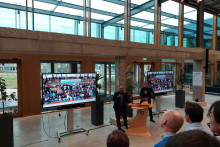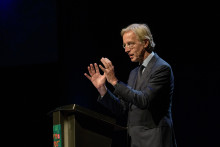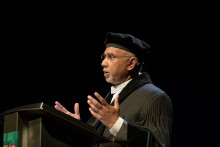What is your initial reaction to the minister's letter?
'It is a comprehensive and well thought-out letter, which has a positive starting point. The minister clearly sees the added value of internationalisation, but also clearly indicates that steering that movement requires a brake and a steering wheel in addition to a gas pedal. In any case, I am pleased that the letter is nuanced; it clearly addresses the situation of universities in border regions, the regional labour market and certain job sectors.'
Is relief or disappointment predominant at the moment?
'Actually neither. The letter is much more comprehensive than expected, even though we did not know what was coming. Of course, we had discussions with the ministry in the run-up and it seems that we were listened to carefully. In that sense, there is relief rather than disappointment: there are positive things in the letter and space is offered to universities in border regions like ourselves. But other things, for example on language policy, are rather uncertain. The exact consequences for us depend very much on the implementation in the further process. Therein lies the crux.'
This letter is a starting point for that?
'At least for the discussion with the universities on the exact details of the implementation. In this letter, the minister outlines the contours of his vision. This is just one step. There will be a parliamentary debate on 15 June on the letter, and it remains to be seen what will emerge from that in terms of motions. Before 15 June, the umbrella associations will have further talks with the ministry - and we will be at the table during these. We hope to give the ministry useful insights. Again, the devil is in the details.'
One of the most striking announcements is about the language policy of universities, with Dutch as the main language. Is that something the UT is already anticipating?
'We are currently reviewing our language policy, also from an inclusivity point of view. After all, we also have enough colleagues at the university who do not or barely come into daily contact with the English language - in that respect, a bilingual policy is more inclusive. We are currently finalising the decision-making on this, so I don't want to get too ahead of myself just yet. Although on paper we have English as our working language, day-to-day practice looks different, with both English and Dutch being used frequently. Therefore, we do critically review our language policy. The letter is not entirely clear about this either; for instance, there also seems to be room to offer extracurricular language training. In such a case, an entire programme doesn't suddenly have to be taught in Dutch.'
Are you sensing unrest in response to the letter already, as for instance at Tilburg University among international teachers?
'What I would like to say to colleagues is: stay calm. There is no reason to panic. And what I said earlier at the New Year's Breakfast I would like to stress again: you are an integral part of our academic community. The letter is there, now we are going to see how it will be worked out. And that will certainly not happen overnight. We go into this process with confidence, sit at the meeting table and will do our best to keep this workable for everyone.'






